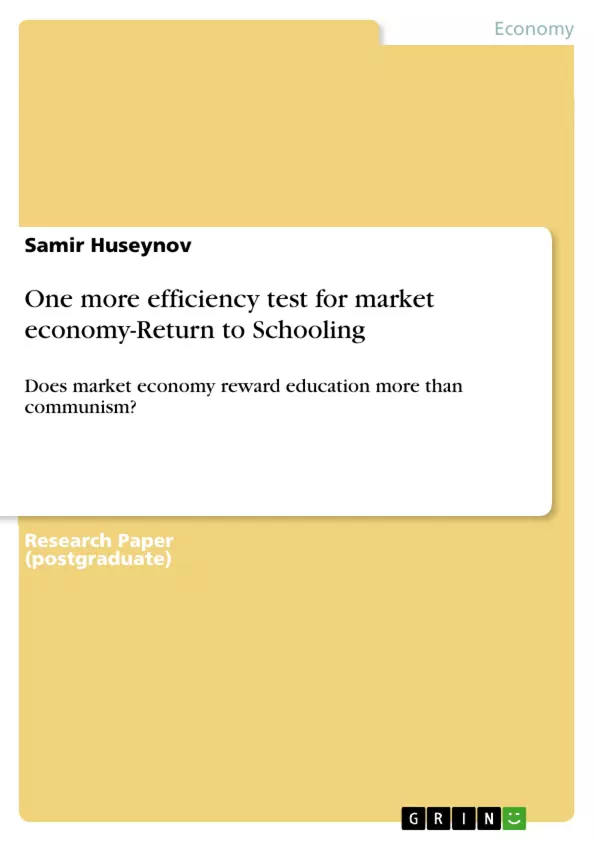This paper aims to analyze the change in return to schooling in Hungary, via comparing communism and market economy periods. As the philosophy of each system is very different, it causes differences in treatment of factors of production as well. While getting familiar with main literature of this topic, it turns out that there is not consensus about the main driving philosophy of communism in terms of organizing production.
Beyond this, my paper can give some insights about efficiency of planned economy and market economy and can serve as a new milestone in long lasting debate between supporters of two systems. As you know, in last century, humanity experienced rivalry of market economy and communism. Superiority of each system was
claimed by their proponents throughout sharp debates, which lasted approximately more than a century. After the collapse of SSSR and its communist block, post communist countries transformed their economic systems to market economy. In today’s world there are still several countries with planned economy, like China with huge economic growth. So, the humanity still has alternative choice in terms of economic systems and “Which one is better? ” is still open question, at least for modern communist economists after the experience of recent economic crises. So, I think my paper can be “fresh” voice in this debate as well.
Inhaltsverzeichnis (Table of Contents)
- Literature Review and Motivation
- Data
- Individual level data
- Empirical framework
- Results
Zielsetzung und Themenschwerpunkte (Objectives and Key Themes)
This paper investigates the change in the return to schooling in Hungary, comparing the communist era with the market economy period. The analysis aims to determine whether market economies reward education more than communist systems. By examining the wage data of Hungarian individuals during these distinct periods, the paper provides insights into the efficiency of planned economies and market economies, contributing to the ongoing debate regarding the superiority of these systems.
- Return to schooling in Hungary under communism and market economy
- Comparison of wage structures and returns to education in different economic systems
- Impact of economic transition on the value of education
- Efficiency of planned economies versus market economies
- Evidence from Hungary's experience in transitioning from a communist to a market economy
Zusammenfassung der Kapitel (Chapter Summaries)
- Literature Review and Motivation: This section presents the theoretical background and motivation for the study. It discusses different perspectives on the role of education in planned economies and the potential impact of transitioning to a market economy on the return to education.
- Data: This chapter details the data used in the analysis, including its source (Hungarian Wage Survey), coverage (1986 and 2004), and specific variables (real wage, experience, education, industry, region).
- Empirical framework: This section describes the econometric models employed to analyze the change in the return to schooling, drawing on Mincer's (1974) earnings equation. The chapter explains the rationale for controlling for factors like industry and region, acknowledging the potential endogeneity of these variables.
Schlüsselwörter (Keywords)
This paper focuses on the return to schooling, economic transition, planned economy, market economy, Hungary, wage structure, earnings equation, econometric analysis, and empirical evidence. The study uses data from the Hungarian Wage Survey to examine the impact of economic system on the value of education.
Frequently Asked Questions
What is the main objective of the study on return to schooling in Hungary?
The study compares the return to schooling in Hungary during the communist era and the market economy period to determine which system rewards education more efficiently.
Which data sources were used for the analysis?
The analysis utilizes individual-level data from the Hungarian Wage Survey, specifically comparing the years 1986 (communism) and 2004 (market economy).
How does the economic system affect the value of education?
The paper investigates whether market economies provide higher wage premiums for education compared to planned economies, where factors of production are treated differently.
What econometric model is applied in this research?
The research applies Mincer's (1974) earnings equation to analyze the relationship between wages, schooling, and work experience.
Why is Hungary a good case study for this transition?
Hungary provides a clear historical record of transitioning from a strict planned economy to a market-based system, allowing for a direct comparison of how the value of human capital changes.
- Quote paper
- Samir Huseynov (Author), 2009, One more efficiency test for market economy-Return to Schooling, Munich, GRIN Verlag, https://www.grin.com/document/188822



